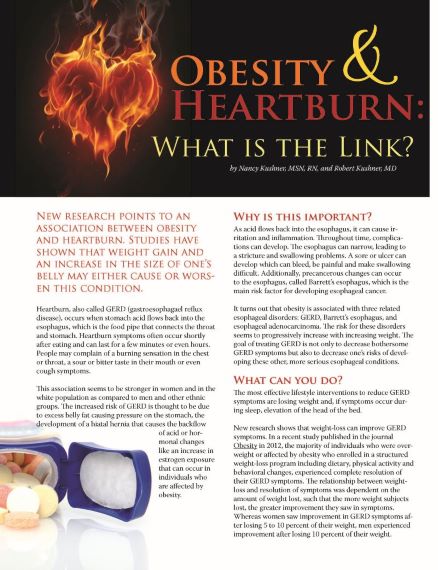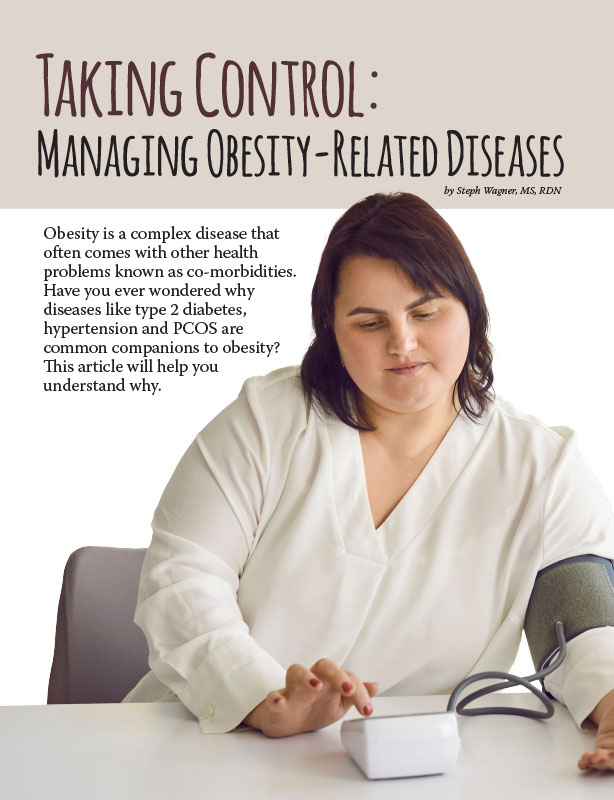Obesity & Heartburn: What is the Link?


by Nancy Kushner, MSN, RN, and Robert Kushner, MD
Winter 2013
New research points to an association between obesity and heartburn. Studies have shown that weight gain and an increase in the size of one’s belly may either cause or worsen this condition.
Heartburn, also called GERD (gastroesophagael reflux disease), occurs when stomach acid flows back into the esophagus, which is the food pipe that connects the throat and stomach. Heartburn symptoms often occur shortly after eating and can last for a few minutes or even hours. People may complain of a burning sensation in the chest or throat, a sour or bitter taste in their mouth or even cough symptoms.
This association seems to be stronger in women and in the white population as compared to men and other ethnic groups. The increased risk of GERD is thought to be due to excess belly fat causing pressure on the stomach, the development of a hiatal hernia that causes the backflow of acid or hormonal changes like an increase in estrogen exposure that can occur in individuals who are affected by obesity.
Why is this important?
As acid flows back into the esophagus, it can cause irritation and inflammation. Throughout time, complications can develop. The esophagus can narrow, leading to a stricture and swallowing problems. A sore or ulcer can develop which can bleed, be painful and make swallowing difficult. Additionally, precancerous changes can occur to the esophagus, called Barrett’s esophagus, which is the main risk factor for developing esophageal cancer.
It turns out that obesity is associated with three related esophageal disorders: GERD, Barrett’s esophagus, and esophageal adenocarcinoma. The risk for these disorders seems to progressively increase with increasing weight. The goal of treating GERD is not only to decrease bothersome GERD symptoms but also to decrease one’s risks of developing these other, more serious esophageal conditions.
What can you do?
The most effective lifestyle interventions to reduce GERD symptoms are losing weight and, if symptoms occur during sleep, elevation of the head of the bed. New research shows that weight-loss can improve GERD symptoms. In a recent study published in the journal Obesity in 2012, the majority of individuals who were overweight or affected by obesity who enrolled in a structured weight-loss program including dietary, physical activity and behavioral changes, experienced complete resolution of their GERD symptoms. The relationship between weight-loss and resolution of symptoms was dependent on the amount of weight lost, such that the more weight subjects lost, the greater improvement they saw in symptoms. Whereas women saw improvement in GERD symptoms after losing 5 to 10 percent of their weight, men experienced improvement after losing 10 percent of their weight.
In another study published in the journal Gastroenterology in 2010, weight-loss through restriction of calories and increased physical activity also demonstrated a significant improvement in participants’ symptoms of GERD. Most importantly, follow-up at 6, 12 and 18 months showed decreases in abdominal fatness and symptoms of heartburn and acid reflux. Reduced GERD symptoms means lower acid levels in the esophagus. Thus, another benefit to losing weight is that patients may be able to eliminate or reduce their over-the-counter (OTC) or prescription GERD medications.
Though improved GERD symptoms has also been shown in patients who undergo bariatric surgery, it is difficult to know if improvement is due to the anti-reflux nature of the surgical procedure or to the weight-loss itself.
There have also been studies on the effectiveness of elevating the head of the bed to decrease GERD symptoms. Compared with patients who slept flat, patients who elevated the head of the bed did have less esophageal acid exposure and fewer reflux symptoms. Studies show that this can be an effective strategy for some patients. You can elevate the head of the bed using wood or cement blocks under the legs of your bed or using wedges between your mattress and box spring.
Effectiveness of Other Lifestyle Modification Measures
The list of foods, drinks and other factors thought to worsen GERD symptoms is quite long and includes:
- Tobacco
- Alcohol
- Carbonated beverages
- Caffeine
- Chocolate
- Onions
- Garlic
- Spicy foods
- Cooked tomato sauce
- Mint
- High-fat meals
The data studying these items is conflicting. More research is needed to determine the effectiveness that stopping smoking or eliminating the listed foods and drinks will have on GERD symptoms. It is recommended to pay attention to see if any of the listed items seem to worsen your condition. If so, you can decrease or eliminate them and see if symptoms improve.
Other Helpful Lifestyle Measures:
- Eat smaller meals.
- Wear clothes that are looser around the waist.
- Don’t lie down for at least three hours after eating a meal.
Medication Therapy
OTC and prescription medications are available to treat GERD. Ask your healthcare provider for guidance when seeking a medication treatment plan to control your symptoms. OTC medication options include antacids (Mylanta or Tums) that neutralize stomach acid; H2 blockers (Tagamet or Pepcid) that reduce stomach acid; and proton pump inhibitors (Prevacid or Prilosec) that also block stomach acid and allow the esophagus to heal. Prescription strength H2 blockers and proton pump inhibitors are also available. Combining medications can sometimes increase effectiveness.
Like all medications, GERD medications can have side effects and can interact with other drugs, so it’s important to discuss this with your healthcare provider. Be sure to talk about what and how much medication you are taking, the effects on your GERD symptoms and any side effects you are experiencing. The goal of medication therapy is to relieve GERD symptoms, allow the esophagus to heal and prevent GERD complications.
Conclusion
If you think you are experiencing heartburn (GERD) symptoms, it is important to discuss these symptoms with your primary care provider. Together, you will be able to identify an effective treatment plan.
About the Authors:
Nancy Kushner, MSN, RN, is a nurse practitioner, health writer and co-author of Dr. Kushner’s Personality Type Diet and Counseling Overweight Adults: The Lifestyle Patterns Approach and Toolkit.
Robert Kushner, MD, is Clinical Director of the Northwestern Comprehensive Center on Obesity in Chicago, Professor of Medicine, Northwestern University Feinberg School of Medicine, Past President of The Obesity Society, author of more than 160 scientific articles on obesity and nutrition, author of Dr. Kushner’s Personality Type Diet, Counseling Overweight Adults: The Lifestyle Patterns Approach and Toolkit and Fitness Unleashed: A Dog and Owner’s Guide to Losing Weight and Gaining Health Together.
by Steph Wagner, MS, RDN Spring 2024 Obesity is a complex disease that often comes with other…
Read Articleby Katherine H. Saunders, MD, DABOM Spring 2024 Menopause probably isn’t anyone’s idea of fun. While this…
Read Articleby Nina Crowley, PhD, RD (with Inspiration from Shawn Cochran) Winter 2024 Dating, no matter your age,…
Read Article








